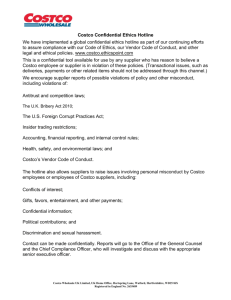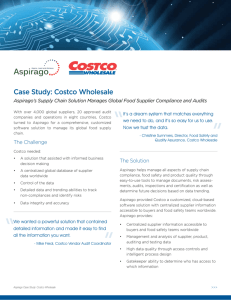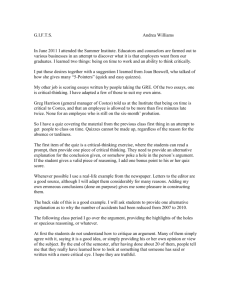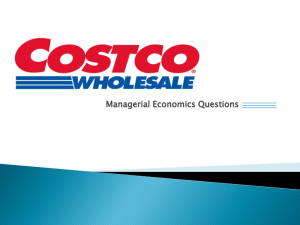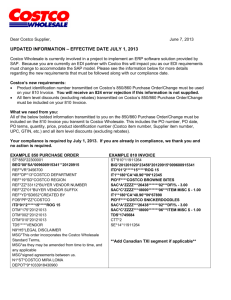Costco Produce Food Safety Audit Expectations
advertisement
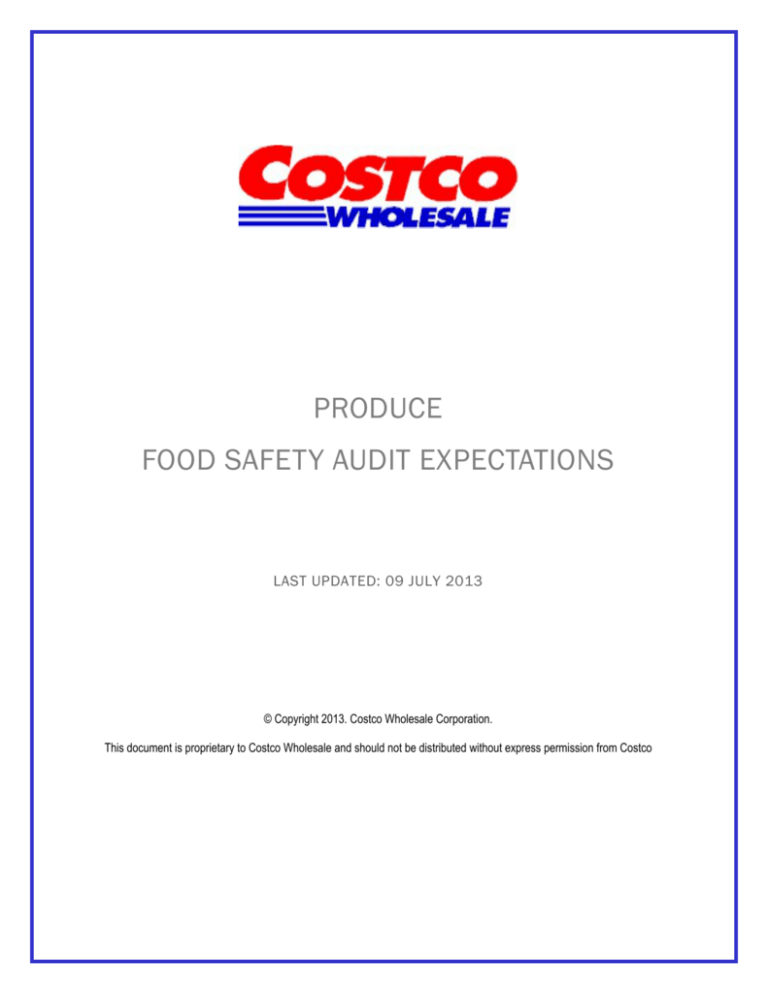
PRODUCE FOOD SAFETY AUDIT EXPECTATIONS LAST UPDATED: 09 JULY 2013 © Copyright 2013. Costco Wholesale Corporation. This document is proprietary to Costco Wholesale and should not be distributed without express permission from Costco CONTENTS Audits ............................................................................................................................................................ 3 Audit Types ................................................................................................................................................... 4 Ranch ........................................................................................................................................................ 4 Greenhouse .............................................................................................................................................. 4 Harvest Crew ............................................................................................................................................ 4 Packinghouse with HACCP....................................................................................................................... 4 Processing with HACCP ........................................................................................................................... 4 Cooling/Cold Storage with HACCP........................................................................................................... 5 Storage and Distribution............................................................................................................................ 5 GFSI Certifications........................................................................................................................................ 5 Standard GAP and GMP Audits ................................................................................................................... 5 Costco Addendums ...................................................................................................................................... 6 Sending Audit Data to Costco....................................................................................................................... 6 Audit Scoring................................................................................................................................................. 6 Reaudits........................................................................................................................................................ 6 Automatic Reaudits....................................................................................................................................... 7 Corrective Action Reports............................................................................................................................. 8 HACCP ......................................................................................................................................................... 8 Definition of HACCP.................................................................................................................................. 8 HACCP Requirements and Scoring.......................................................................................................... 8 HACCP Training Requirements ................................................................................................................ 8 Resources for HACCP .............................................................................................................................. 8 Resources for Food Safety Program Development .................................................................................. 8 Foreign Material Control – Processors ......................................................................................................... 9 Pest Control ................................................................................................................................................ 10 Glove Policy ................................................................................................................................................ 10 Revised as of 07/09/2013 and replaces all previous versions. Page 2 of 14 © Copyright 2013. Costco Wholesale Corporation. This document is proprietary to Costco Wholesale and should not be distributed without express permission from Costco. Traceback / Mock Recall Exercise ............................................................................................................. 10 Processing Facilities (year round)........................................................................................................... 10 Processing (non year round), Packinghouses, Coolers and Cold Storage Facilities ............................. 11 Raw Material Sources – Processing, Packinghouses, Coolers, Cold Storage, and Growers ................ 11 Test and Hold Program Guidelines ............................................................................................................ 11 Microbial Testing – Processing, Packinghouse, Cooler and Cold Storage ................................................ 12 Food Contact Surfaces ............................................................................................................................... 12 Miscellaneous ............................................................................................................................................. 12 All Operations.......................................................................................................................................... 12 GAP Audits.............................................................................................................................................. 13 GMP Audits ............................................................................................................................................. 13 Contacts...................................................................................................................................................... 13 US Contacts ............................................................................................................................................ 13 Canadian Contacts.................................................................................................................................. 14 AUDITS All those that grow, harvest, pack or further process fresh produce are required to have an annual food safety audit. All those that grow, harvest, pack or further process fresh produce in China are required to have an audit every six months. Annual audits are to be conducted as close as possible to the anniversary of the previous annual audit date. New entities/suppliers with a food safety audit conducted in the past year by a Costco approved audit company may submit the audit to Costco for review. Corrective actions must be included for each deficiency on the audit. In order to be more beneficial to the auditee, an auditor should audit a site no more than three years in a row. The same audit company is fine, as long as the auditor changes a minimum of every three years. A product recall or other serious incident will initiate a requirement for a new food safety audit. Revised as of 07/09/2013 and replaces all previous versions. Page 3 of 14 © Copyright 2013. Costco Wholesale Corporation. This document is proprietary to Costco Wholesale and should not be distributed without express permission from Costco. AUDIT TYPES RANCH The ranch audit is usually performed one time each year or during the growing season. The ranch audit is divided into sections that correspond to areas of potential contamination risk in the field operation. These areas include ranch history, adjacent land use, fertilizer usage, water usage, pest control, harvest practices, employee safety & hygiene and food security. A “ranch” is defined as a parcel of ground (not necessarily a “lot” for production purposes) with the following characteristics: common management, common water supply and contiguous grounds. For the purpose of farm or ranch audits, manual development or self-audits, a ranch or farm is defined as contiguous ground that is under common management. GREENHOUSE The greenhouse audit is usually performed one time each year or during the growing season. The greenhouse audit is divided into sections that correspond to areas of potential contamination risk in the greenhouse operation. These areas include traceability, ground history, adjacent land, pest and foreign material controls, growing media, fertilizer/crop nutrition, irrigation/water use, plant protection, employee hygiene and food security. A harvest crew audit (see below for details) will be performed at the same time as the greenhouse audit module in order to assess areas of potential contamination risk in the harvesting operation. A greenhouse is defined as a building constructed of glass or plastic, for the cultivation of plants under controlled environmental conditions. HARVEST CREW The harvest crew audit is performed periodically during the harvest season. The harvest crew audit is divided into sections that correspond to areas of potential contamination risk in the harvesting operation. These areas include employee safety & hygiene, harvest practices and food security. A ‘harvest crew’ is defined as a crew of harvest personnel under common management. PACKINGHOUSE WITH HACCP The packinghouse audit is performed at a minimum of once per year. Questions are used to assess the facility’s food safety program. The audit is comprised of three main sections; a Good Manufacturing Practices section, a Food Safety File Requirements section and a HACCP section. The audit encompasses the areas of pest control, equipment, sanitation, employee hygiene practices, and all other operational practices and documentation as they relate to food safety. Food security is also addressed. A “packinghouse” is where whole commodities are prepared and packed for commercial distribution after being subjected to processes such as sorting, washing, weighing, etc. PROCESSING WITH HACCP The processing audit is performed at a minimum of once per year. The processing audit questions are used to access the facility’s food safety program as it applies to Good Manufacturing Practices under 21 CFR, part 110, and relevant parts of the Food Code, 2001 (FDA/USPHIS), including HACCP requirements. The audit is comprised of three main sections: a Good Manufacturing Practices section and a Food Safety File Requirements section and a HACCP section. The audit encompasses the areas of pest control, equipment, sanitation, employee hygiene practices, and all other operational practices and documentation as they relate to food safety including HACCP plans. Food security is also addressed. Revised as of 07/09/2013 and replaces all previous versions. Page 4 of 14 © Copyright 2013. Costco Wholesale Corporation. This document is proprietary to Costco Wholesale and should not be distributed without express permission from Costco. COOLING/COLD STORAGE WITH HACCP The cooling/cold storage audit is performed a minimum of once per year. The cooling/cold storage audit questions are used to assess the facility’s food safety program. The audit is comprised of two main sections: Good Manufacturing Practices section and a Food Safety File Requirements section. The audit encompasses the areas of pest control, equipment, sanitation, employee hygiene practices, and all other operational practices and documentation as they relate to food safety. Food security is also addressed. A ‘cooling/cold storage facility’ is where product is temporarily stored prior to distribution in order to maintain the proper temperature. Pre-cooling processes (ice injectors, Hydrovac, pressure cooling, etc.) may also be used in the daily operations. If any packing, repacking, and grading etc. is occurring on site, a Packinghouse Audit should be used. STORAGE AND DISTRIBUTION The Storage & Distribution audit is performed at a minimum of once per year. The Storage & Distribution audit questions are used to assess the facility’s food safety program. The audit is comprised of two sections: Good Manufacturing Practices section and a Food Safety File Requirements section. The audit encompasses the areas of pest control, equipment, sanitation, employee hygiene practices, and all other operational practices and documentation as they relate to food safety. Food security is also addressed. A ‘storage and distribution facility’ is where generally large retailers, foodservice companies or distribution companies store product temporarily prior to further distribution to local markets. It also includes terminal market operations where multiple companies are located on one site from which all companies distribute independently. If there is any packing, repacking, grading, etc., occurring on site, then a Packinghouse Audit should be used. GFSI CERTIFICATION Costco will accept the following GFSI certifications, with a minimum overall score of 85%: CanadaGAP, PrimusGFS and SQF Edition 7. Costco will also accept BRC Certification Grade B and above and GlobalG.A.P. Certification. Group certifications must be requested in writing, prior to the audit taking place and may be allowed. All GFSI approved Certifications for Harvest Crews, Growing Areas, Packinghouses, Coolers, Cold Storage and Processing facilities must include the appropriate Costco Addendum. GFSI Certifications will be accepted from the following Certification Bodies: NCSI, NSF-AG, NSF-GFTC, PrimusLabs, SAI Global and SGS. STANDARD GAP AND GMP AUDITS Costco will accept the following GAP and GMP food safety audits: NSF-AG, NSF-GFTC and PrimusLabs audits that include the appropriate Costco Addendum, with a minimum overall score of 85%. Costco will also accept GAP and GMP food safety audits from SGS that include the appropriate Costco Addendum and meet the passing criteria for the audit. Costco will accept GMP audits from all audit companies currently approved for Costco Food Safety Audits/non-produce. Please refer to the Food Safety Audit Expectations, for a current list. Revised as of 07/09/2013 and replaces all previous versions. Page 5 of 14 © Copyright 2013. Costco Wholesale Corporation. This document is proprietary to Costco Wholesale and should not be distributed without express permission from Costco. COSTCO ADDENDUMS The Costco Addendums can be found through a link on the Azzule website. For your convenience, the link is listed below. The addendums are also available from the Costco Food Safety Department and/or your buyer. All audits / certifications done for Costco must include the appropriate addendum. http://www.azzule.com/services/costcoaddendumsandexpectations.aspx SENDING DATA TO COSTCO Costco is using Azzule Systems to manage ALL PRODUCE audit documents, including corrective actions. All entities/suppliers supplying produce to Costco must contact their food safety auditing firm and notify them to contact Azzule Systems in order to have the information uploaded and sent to Costco. The contact information for Azzule Systems is: securesites@azzule.com As audits are completed, they will be uploaded by the auditing firm to Azzule Systems, and from there will be transferred to the Costco Wholesale dedicated area within the website. This submission process should take place within 7 calendar days of the audit date. Each entity/supplier is to submit their CAR (corrective action report) to their audit company or through Azzule, within 14 calendar days of the audit posting. AUDIT SCORING FOR PRIMUSLABS, NSF-AG, NSF-GFTC AND SGS AUDITS Score Action Required 98 – 100% No corrective actions needed 85 – 97% < 85% Corrective actions required Corrective actions and reaudit required REAUDITS Audits require a minimum overall score of 85% to pass. Audits scoring less than 85% will be required to have a reaudit. Failure to pass an unscored audit will also require a reaudit. Reaudits for ranch and harvest crew audits must be conducted within 30 calendar days of the original audit date. Reaudits for packinghouse, cooler, cold storage and processing audits must be conducted within 60 calendar days of the original audit date. If the growing season is finished, the audit must take place within the first 30 calendar days of the next growing season. A product recall or other serious incident will initiate a requirement for a new food safety audit. Revised as of 07/09/2013 and replaces all previous versions. Page 6 of 14 © Copyright 2013. Costco Wholesale Corporation. This document is proprietary to Costco Wholesale and should not be distributed without express permission from Costco. AUTOMATIC REAUDITS Ranch and Harvest Crew – Section 1 only Processing, Packinghouse, Cooler and Cold Storage – Sections 1 & 2 Automatic Reaudits – Section 1 No functioning hand-wash stations. Product contamination/adulteration is observed. Product mishandled by workers, such as, but not limited to, using cloths or towels to remove dirt and/or debris. Failure to have a written pest control program. Evidence of insects, rodents, birds, reptiles or mammals in any product, ingredient or primary packaging supplies. Water test results fail to meet set standards and no corrective action has been taken to include a re-test. Evidence of systemic fecal contamination by wild animals and/or a single account of human or domestic animal fecal matter, in the growing area, close to the growing area or in any storage area. Employees with obvious sores, infected wounds or other infectious illnesses are allowed to have direct contact with exposed food products, production, equipment or storage areas. Products not properly coded for traceability throughout the process. Automatic Reaudits – Section 2 Processing facilities, Packinghouses, Coolers and Cold Storage facilities supplying product to the U.S. and not meeting registration requirements of the Public Health Security and Bioterrorism Preparedness and Response Act of 2002 (the Bioterrorism Act) or companies located in the U.S. supplying product to Costco locations in other countries. http://www.registrarcorp.com/fda-food/registration/ Failure to take corrective actions, when critical limits are not met in a HACCP program. A documented Food Safety Plan/Manual (for facility auditee) has not been established. A documented SSOP Program (Standard Sanitation Operating Procedures) has not been established and implemented. Food allergens are present and an allergen control program has not been developed. Evidence of serious pest infestations (rodents, insects, birds, etc., including decomposed pests) inside the facility, including in pest control devices. Revised as of 07/09/2013 and replaces all previous versions. Page 7 of 14 © Copyright 2013. Costco Wholesale Corporation. This document is proprietary to Costco Wholesale and should not be distributed without express permission from Costco. CORRECTIVE ACTION REPORT (CARS) Corrective Actions are part of the audit process and a requirement of doing business with Costco. Auditees with an audit scoring below 98% must post a CAR (Corrective Action Report) to Azzule within 14 calendar days of the audit being posted. Auditees must contact their Audit Company regarding the process of submitting CARs to Azzule for uploading to the Costco Site. COSTCO HACCP REQUIREMENTS All facilities that supply Costco are required to operate under a HACCP Program. DEFINITION OF HACCP HACCP is an acronym that stands for Hazard Analysis Critical Control Point. HACCP is a method to help manufacturers identify and evaluate their processes to control food safety issues. Essentially, HACCP helps manufacturers identify: What can go wrong in their process? Physical, microbiological, chemical and other risks to their processes How to control their process so that it doesn’t go wrong. Validation If it does go wrong, what happens then? How do you fix it? HACCP AUDIT SCORING All processing facilities, packinghouses, coolers and cold storage facilities that supply Costco are required to operate under a HACCP Program. Facilities that do not have a current HACCP program in place will be required to develop a HACCP program within 120 days after their audit is posted and submit it to their audit company for posting to the Azzule website. HACCP TRAINING The person or persons responsible for the HACCP program must complete formal HACCP training and have the documentation available for review. RESOURCE FOR HACCP TRAINING HACCP Alliance http://haccpalliance.org/ NEHA Food Safety Training http://www.nehatraining.org/products/haccp.htm Revised as of 07/09/2013 and replaces all previous versions. Page 8 of 14 © Copyright 2013. Costco Wholesale Corporation. This document is proprietary to Costco Wholesale and should not be distributed without express permission from Costco. HACCP Training http://www.haccptraining.org/ Guelph Food Technology Centre (English) http://www.gftc.ca/courses-and-training/ Institut de technologie agroalimentaire (French) http://www.ita.qc.ca/fr/formationcontinue/perfectionnement/alimentaire/Pages/Alimentaire.aspx RESOURCES FOR FOOD SAFETY PROGRAM DEVELOPMENT Guide to Minimize Microbial Food Safety Hazards for Fresh Fruits and Vegetables http://www.fda.gov/Food/GuidanceRegulation/GuidanceDocumentsRegulatoryInformation/Produc ePlantProducts/ucm187676.htm Developing a Food Safety Plan http://extension.psu.edu/food/safety/farm/how-do-i-write-a-food-safety-plan/sample-harmonizedfood-safety-plan/view USDA Pesticide Data Program http://www.ams.usda.gov/AMSv1.0/ams.fetchTemplateData.do?template=TemplateC&navID=Pesti cideDataProgram&rightNav1=PesticideDataProgram&topNav=&leftNav=ScienceandLaboratories& page=PesticideDataProgram&resultType Produce Marketing Association www.pma.com United Fresh Produce Association www.unitedfresh.org PrimusLabs Document Development Program http://www.primuslabs.com/rs/webtools.aspx?menuid=3 PrimusLabs Manual Development Toolkit (GMP) http://intranet.primuslabs.com/Toolkit/User/Default.aspx On Farm Food Safety –Risk Assessment, Create a Food Safety Manual http://onfarmfoodsafety.org/ Canadian Food Inspection Agency’s HACCP / Food Safety Enhancement Program (FSEP) http://www.inspection.gc.ca/eng/1297964599443/1297965645317 (English) http://www.inspection.gc.ca/fra/1297964599443/1297965645317 (French) Health Canada - Pesticides and Pest Management http://www.hc-sc.gc.ca/cps-spc/pest/index-eng.php (English) http://www.healthycanadians.gc.ca/environment-environnement/pesticides/index-fra.php#a1 (French) Canadian Produce Marketing Association www.cpma.ca FOREIGN MATERIAL CONTROL – PROCESSORS Costco requires processors to control physical hazards by the use of x-ray or metal detection technology. Entities/suppliers without x-ray or metal detection will be evaluated by the auditor in conjunction with Costco personnel to determine the risk of the process. If risk is considered low, a device will not be Revised as of 07/09/2013 and replaces all previous versions. Page 9 of 14 © Copyright 2013. Costco Wholesale Corporation. This document is proprietary to Costco Wholesale and should not be distributed without express permission from Costco. required. If risk is considered medium to high, the site will be required to install a foreign material detection device as soon as possible (preferably x-ray technology). Costco requires facilities to document hourly checks to confirm the foreign material detection device is operating correctly. When checking the foreign material detection device, the auditor will ask plant staff to demonstrate that all devices are working properly. For metal detectors the device must be challenged with ferrous, non-ferrous and stainless steel contaminants and for an x-ray an appropriate challenge device must be used. Every device must be accompanied by an appropriate functioning rejection device (belt, air jet, etc.). A written procedure must be in place to control product rejected by the foreign material detection device. The program must state how the product is segregated from general production and handled. This process must be documented. If it is determined that a facility requires foreign material detection and there is not a device in place or if the facility is not able to demonstrate that all devices are working properly by the facility’s anniversary audit, an automatic failure will occur and a reaudit will be required. Costco would like all vendors to consider x-ray technology when replacing their foreign material detection equipment. PEST CONTROL Pest control programs must be developed and monitored by licensed, certified pest control personnel. In the case of a country without this requirement, pest control personnel must be trained and have written protocol to demonstrate their understanding of pest control as it applies to food safety. GLOVE POLICY Costco requires that all employees who work for RTE (ready-to-eat) processors wear gloves. RTE processors that have a documented and verified hand washing program may be exempt from glove usage. This will be evaluated on a case by case basis. Costco prohibits the use of Latex AND powder-free Latex gloves. Gloves are to be provided by the grower or packinghouse. Costco prohibits workers in any capacity from supplying their own gloves of any kind. In a processing environment, cotton gloves may used only if non-Latex gloves are worn over them. TRACE BACK / MOCK RECALL EXERCISE PROCESSING FACILITIES (YEAR-ROUND) For year-round processing facilities, Costco requires a trace back exercise at least three times a year. One of the trace back exercises should be during their food safety audit, on a Costco item chosen at the auditor’s discretion. Documentation must indicate the date and time the exercise was initiated, product chosen, amount produced, affected lot codes, percent located, time exercise was completed. The exercise must include documentation supporting the trace back from the chosen affected finished product Revised as of 07/09/2013 and replaces all previous versions. Page 10 of 14 © Copyright 2013. Costco Wholesale Corporation. This document is proprietary to Costco Wholesale and should not be distributed without express permission from Costco. lot(s) to all the potentially affected raw material(s), and then also show how the system can then trace all the potentially affected product(s) and the affected customers who have received the product(s). 100% of product should be located within two hours. Companies with corporate generated recall systems in place need only to provide the auditor with a copy of their program and a sample mock recall or trace back exercise. PROCESSING (NON YEAR-ROUND, PACKINGHOUSES, COOLERS AND COLD STORAGE FACILITIES Costco requires non year-round processing, packinghouses, coolers and cold storage facilities to do a trace back exercise at least twice a year. One of the trace back exercises should be during their food safety audit, on a Costco item chosen at the auditor’s discretion. Documentation must indicate the date and time the exercise was initiated, product chosen, amount produced, affected lot codes, percent located, time exercise was completed. The exercise must include documentation supporting the trace back from the chosen affected finished product lot(s) to all the potentially affected raw material(s), and then also show how the system can then trace all the potentially affected product(s) and the affected customers who have received the product(s). 100% of product should be located within two hours. Companies with corporate generated recall systems in place need only to provide the auditor with a copy of their program and a sample mock recall or trace back exercise. RAW MATERIAL SOURCES – PROCESSING, PACKINGHOUSE, COOLERS, COLD STORAGE, AND GROWERS Costco entities/suppliers must have a program in place to approve and monitor their suppliers (all raw materials, ingredients and primary packaging). Raw material and ingredient suppliers must provide them with a current (within 1 calendar year) third-party food safety audit and a product specification sheet which includes product attributes, labeling and code dates. Additionally, facilities supplying raw materials and ingredients must be operating under a HACCP program. Primary packing facilities must supply a Letter of Guarantee or a third-party food safety audit, have an ongoing, documented monitoring program to evaluate primary packaging compliance to specifications and include a method to identify specific lot numbers. Effective with audits done in January 2014, all primary packing suppliers must also provide a third-party food safety audit. TEST AND HOLD PROGRAM GUIDELINES – READY TO EAT PRODUCE (US ONLY) Costco Wholesale has a test and hold policy in place for all ready-to-eat produce. This includes items such as, but not limited to, cut salad mixes, baby leaf salads, cut fruit, and prepared vegetable trays. With the exception of cantaloupe, Costco does not consider whole fruit ready-to-eat produce. Costco specifications for ready-to-eat produce are as follows: Target Total Plate Count (TPC) Generic E. coli EHEC Salmonella Maximum Level < 100,000 cfu/gram 1,000,000 cfu/gram <10 cfu/gram 50 cfu/gram Negative (test method must detect for Stx1 or Stx2 and EAE genes at a minimum) Negative Revised as of 07/09/2013 and replaces all previous versions. Page 11 of 14 © Copyright 2013. Costco Wholesale Corporation. This document is proprietary to Costco Wholesale and should not be distributed without express permission from Costco. Cantaloupe Specific Target Total Plate Count (TPC) Generic E. coli EHEC Salmonella Maximum Level < 5,000,000 cfu/gram 10,000,000 cfu/gram <10 cfu/gram 100 cfu/gram Negative (test method must detect for Stx1 or Stx2 and EAE genes at a minimum) Negative PRODUCT MUST BE IN SUPPLIER CONTROL UNTIL ALL TEST RESULTS HAVE BEEN COMPLETED AND RESULTS ARE SHOWN WITHIN ABOVE TOLERANCES MICROBIAL TESTING – PROCESSING, PACKINGHOUSE, COOLER, AND COLD STORAGE AUDITS There must be records of routine equipment and facility microbiological testing, for production and storage facilities that either have a washing step or involve high humidity storage. Frequency and choosing where to swab is to be based on the risk assessment of the product and facility involved. If out of spec results occur, then full details of corrective actions must be available. FOOD CONTACT SURFACES With the exception of commodities where using wooden bins is the industry standard, produce must not come in contact with surfaces which are not accessible and/or cannot be cleaned, including but not limited to the following: foam rubber, any type of carpet, non food-grade plastic, etc. Effective January 1, 2013, a loss of points on this question will result in a major non-conformance. Effective January 1, 2014, a loss of points on this question will result in an automatic failure and a reaudit will be required to verify that the situation has been corrected. MISCELLANEOUS ALL OPERATIONS Hand washing must take place with soap and water. There is no approved substitute for hand washing, including hand wipes, sanitizer, etc. Finished product sell unit (for example, clam shell, bag, package, and carton) must be marked with a useby, sell-by or packed-on code that can be used for traceability/recall purposes. Julian dates are not acceptable. Suppliers should refer to item specifications, provided by Costco buyers. Revised as of 07/09/2013 and replaces all previous versions. Page 12 of 14 © Copyright 2013. Costco Wholesale Corporation. This document is proprietary to Costco Wholesale and should not be distributed without express permission from Costco. GAP AUDITS A minimum of one field sanitation unit, to include a toilet and a hand wash station, for each 20 employees, is required per OSHA standards. Toilet and hand washing facilities must be within a 5 minute walking distance for all employees. Hand wash stations should be located outside portable restroom facilities, in order for hand washing activities to be observed by supervisors. Picking bags, gloves, knives and aprons must be covered under equipment storage and control procedures and be on a documented cleaning schedule. The grower is responsible to maintain cleanliness and good repair. Harvesting equipment must be on a documented cleaning and sanitizing program. A monitoring program to verify that successful cleaning and sanitizing of all product contact surfaces must be in place. GMP AUDITS A minimum of one restroom facility for each 15 employees is required, per OSHA standards. Hand sinks must be available inside restroom facilities, for use after using the restroom and also near the workers entrance to the facility, for use prior to starting work, after a break or at any other time hands become contaminated. Larger facilities may require additional hand sinks. Employees of all entities, with the exception of those that do not handle product, should wear hair nets and appropriate coverings for all facial hair, such as beards and moustaches. This includes packinghouses and cold storage facilities, if applicable. Costco does not view a ball cap as a hair cover or hair restraint. Although countries outside the US may have different requirements, Costco does not allow drinking water (or any beverage) in any container, on the packing line or processing floor. Employers must provide employees adequate fresh water supplies located in areas which do not create food safety/ hygiene issues. Employers in the US must meet all Federal and State laws pertaining to supplying drinking water to staff, for example 29 CFR 910.141(b)(1)(i), 29 CFR1928(c)(1). COSTCO FOOD SAFETY CONTACTS U.S. CONTACTS Name Title Phone Email Milinda Dwyer Toni Roberts Mike Freal Eric Benolkin Steve Bell Christine Summers Produce Audits Produce Audits Audit Support Audit Support Audit Manager Director 425.427.7474 425.427.7211 425.313.6801 425.427.7508 425.313.8760 425.313.6097 mdwyer@costco.com troberts@costco.com mfreal@costco.com ebenolkin@costco.com sdbell@costco.com csummer@costco.com Revised as of 07/09/2013 and replaces all previous versions. Page 13 of 14 © Copyright 2013. Costco Wholesale Corporation. This document is proprietary to Costco Wholesale and should not be distributed without express permission from Costco. CANADIAN CONTACTS Name Title Phone Email Rhonda Keeler Marcelle Lavergne Audit Manager Director 613.221.2936 613.221.2311 rhonda.keeler@costco.com marcelle.lavergne@costco.com Revised as of 07/09/2013 and replaces all previous versions. Page 14 of 14 © Copyright 2013. Costco Wholesale Corporation. This document is proprietary to Costco Wholesale and should not be distributed without express permission from Costco.
